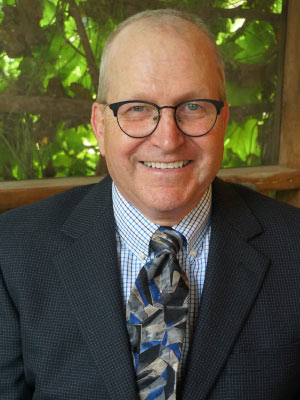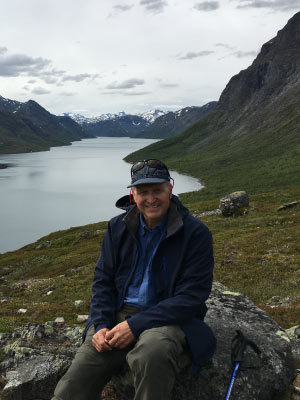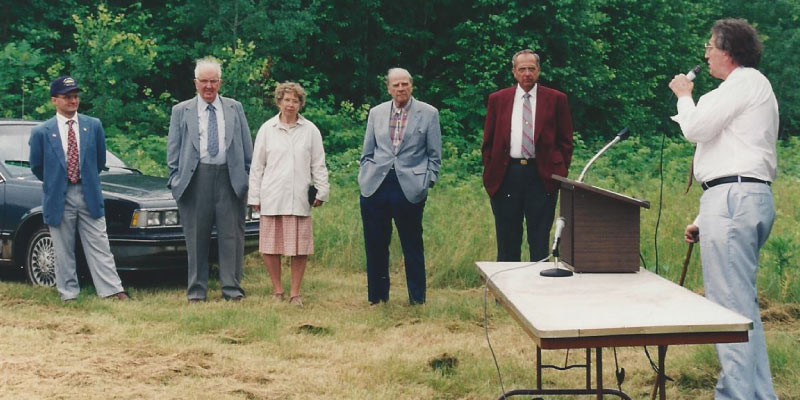
M.S. and PhD Land Resources (now Environment and Resources) Energy Analysis and Policy (EAP) Certificate
With more than 30 years of experience researching, analyzing, and implementing energy efficiency policies and programs, Nelson Institute Distinguished Alumni Award winner Dan York has seen the industry rapidly change and grow. Through it all, he has been thankful for the interdisciplinary education he received at the Nelson Institute as it has prepared him to meet the challenges of an ever-changing field.
While York has spent the past two decades working with the American Council for an Energy Efficient Economy (ACEEE), York began his energy career as a graduate student at the Nelson Institute.
“I came to the Nelson Institute because I had an interest in energy policy,” York said. “My interest in the area actually started while I was a student in high school and we had the first energy crisis. I connected the dots between energy use and the environmental problems we were seeing.”
Having graduated from an undergraduate mechanical engineering program at the University of Minnesota, York was looking for a graduate program that would combine his technical expertise in engineering with his interest in energy and environmental studies.
“I found happily that UW-Madison had a program that was tailor-made to my interests and interdisciplinary approach to energy policy,” York said of the Land Resources and Energy Analysis and Policy (EAP) Certificate within the Nelson Institute. “I was delighted with the choice to attend and it felt completely right.”
As a graduate student, York focused on his certificate in EAP, which is an interdisciplinary program that provides students with knowledge of the scientific, technical, economic, political, and social factors that shape energy policy formulation and decision-making. Through this program, York had an opportunity to conduct hands-on international work with an organization that conducts policy-oriented research.
Dan York talks about his work.
“One of my favorite experiences as a graduate student was getting involved in the International Institute for Applied Systems Analysis,” York said. “It’s a research institute in Austria and I was involved in some energy and planning work with them so I got to go to their conference. It was great fun to interact with them.”
With the successful completion of his M.S. York decided to continue on at the Nelson Institute and complete his PhD.
“Lots of great things that happened while I was pursuing a masters, and I was so close to a PhD so I decided to keep going. There is no specific EAP curriculum at the PhD level, but I extended it and it led to a life changing experience,” shared York.

The life changing opportunity came in the form of a Fulbright Fellowship, which York obtained after attending an international summer school at the University of Oslo. Through the connections he made at the summer school, York secured a six-month fellowship working at the University of Oslo’s Centre for Development and the Environment in Norway.
“It was outstanding,” York said of the experience. “And, it was so much fun I wound up getting a job with a regulatory agency in Norway for another six months and that was the basis for my dissertation.”
After completing his PhD at the Nelson Institute, York worked as a senior project manager at the Energy Center of Wisconsin (now Slipstream), where he helped to create the Midwest Energy Efficiency Alliance (MEEA). This organization is “a collaborative network advancing energy efficiency in the Midwest for sustainable economic development and environmental stewardship.” And, although York moved on from Energy Center of Wisconsin, he remains proud of his work there and continues to be associated with MEEA. In fact, he is currently serving his third term on their board.
After working with the Energy Center for Wisconsin, York transitioned to a role as a senior research associate and director of utilities at ACEE.
“I had long been interested in ACEEE but they were based in Washington D.C. and we have strong roots in the Midwest, so the move to work in Washington D.C. never seemed possible,” York shared. “Long story short, we knew some people who worked remotely for ACEEE and a position opened up so I jumped on it. I convinced them that I could stay in Madison and work for them and after 20 years, it seems to have worked out”
In current role as a senior fellow for utilities and local policy at ACEEE, York conducts research and writes, having authored more than 40 reports and white papers on energy as well as contributing to books. He also serves as a speaker at a variety of international conferences and has taught courses and conducts research primarily in the U.S.; all in an effort to advance energy efficiency policies and programs.
As one nominator said, “He is internationally recognized for his work tracking and analyzing trends and emerging issues in utility-sector energy efficiency programs.”
While York’s career has required him to face a variety of challenges as the energy field changes, he remains passionate about his work and the inspiration that led him here.
“The clean energy world is really growing so fast right now, but it’s fun to have witnessed this and been a part of it all,” York said. “I’m forever proud to be a part of the Nelson Institute and EAP. There’s clearly a great need for people working on environmental problems in a practical way and the students and faculty at the Nelson Institute are world class leaders.”
It’s because of the Nelson Institute’s positive reputation and its connection to Nelson Institute namesake Gaylord Nelson that York said he is proud to have received the Distinguished Alumni Award.
“It’s humbling and I’m very honored to have received this award,” York said. “My hometown is Amery, Wisconsin which is a stone’s throw from where Gaylord Nelson grew up. I had an uncle and a cousin of my Dad who grew up and attended school with Gaylord. Also, Gaylord has been a longtime personal hero for the environment and I did meet him a few times.”

York shared that several years ago, some of his family land in Amery was selected to become a green space and because of its location and some connections within the town, Nelson was willing to attend the land dedication of York Park in Amery.
“It’s a long way of saying that this Nelson Institute award means a lot,” said York. “It has a special place in my memory as it’s connected to Gaylord Nelson.”